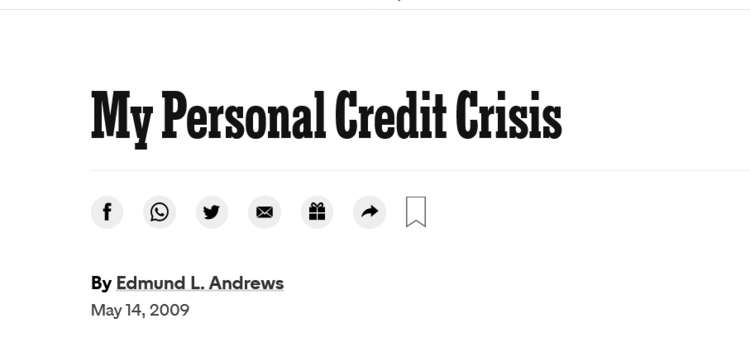
By Steve Sailer
05/16/2009
The New York Times Magazine features a long article, My Personal Credit Crisis, by Edmund L. Andrews about America’s least sympathetic-sounding deadbeat, himself:
If there was anybody who should have avoided the mortgage catastrophe, it was I. As an economics reporter for The New York Times, I have been the paper’s chief eyes and ears on the Federal Reserve for the past six years. I watched Alan Greenspan and his successor, Ben S. Bernanke, at close range. I wrote several early-warning articles in 2004 about the spike in go-go mortgages. Before that, I had a hand in covering the Asian financial crisis of 1997, the Russia meltdown in 1998 and the dot-com collapse in 2000. I know a lot about the curveballs that the economy can throw at us. But in 2004, I joined millions of otherwise-sane Americans in what we now know was a catastrophic binge on overpriced real estate and reckless mortgages. Nobody duped or hypnotized me. Like so many others — borrowers, lenders and the Wall Street dealmakers behind them — I just thought I could beat the odds. We all had our reasons. The brokers and dealmakers were scoring huge commissions. Ordinary homebuyers were stretching to get into first houses, or bigger houses, or better neighborhoods. Some were greedy, some were desperate and some were deceived.
Divorce, second marriage, a passel of kids, $4k per month alimony/child support, a big brick house in upscale Silver Spring, MD (conveniently located right on the northern border of DC, next to Chevy Chase), Alt-A mortgage, $50k in credit card debt, beach house rental, new wife loses her silly job as an editor for a foundation, subprime refi, default.
There’s no mention of them even thinking about, as an alternative to refinancing, selling the fancy house after it goes up 10% and moving some place less Silver Springy.
One detail caught my eye: Andrews' says his base salary is $120k, but also "I was earning extra money working overtime at The Times." You get paid overtime for reporting on the Fed for the New York Times? Like if you work 50 hours per week instead of 40, you make, what, $174k annually? Sweet!
The last time I got paid overtime was when I was an 18-year-old fry cook at Burger King. That made perfect sense because the boss could tell exactly when I was working: when I was standing over the vat of boiling oil. Since the age of 20, however, I've had jobs where I mostly tap on keyboards (starting with my HP calculator when I got a summer job in college as a research assistant to a CFO), so nobody can tell when I’m really working versus when I’m just amusing myself. It’s not worth your while to try to figure out what part of the 70 hours per week I’m tapping on a keyboard is work or fun. That’s the reason you hire me: because what amuses me often turns out to be what you need to know.
So, how does the New York Times tell what part of Edmunds' daily routine of surfing the Internet and talking on the phone is work and what part is fun? I guess they just take his word for it, which, having read about his financial probity, doesn’t seem like a smart thing to do.
The article ends:
I was actually beginning to feel sorry for Chase. It seemed to be so flooded with defaulting borrowers that it didn’t have time to foreclose on my house. Eight months after my last payment to the bank, I am still waiting for the ax to fall.Edmund L. Andrews is an economics reporter for The Times and the author of “Busted: Life Inside the Great Mortgage Meltdown,” which will be published next month by W.W. Norton and from which this article is adapted.
So, this guy has been living in Silver Spring rent-free for the last eight months and he’s turned his rent-free life into a book (which I have a suspicion he wrote on a paid book leave sabbatical from the Times), which he’s gotten the New York Times Magazine to promote? No wonder the Times had him covering the Fed. He’s financial freaking genius.
This is a content archive of VDARE.com, which Letitia James forced off of the Internet using lawfare.